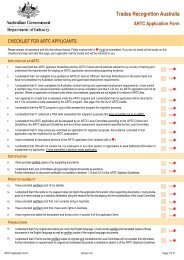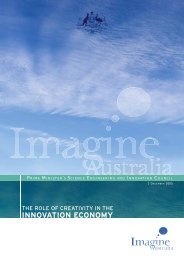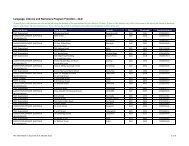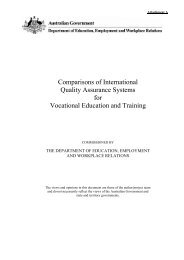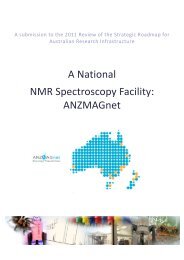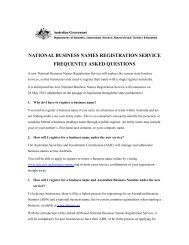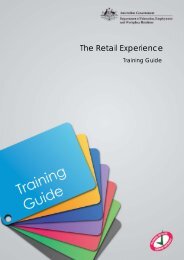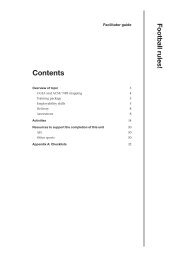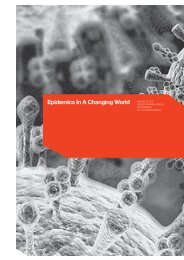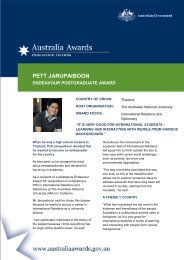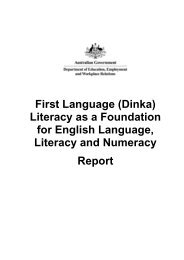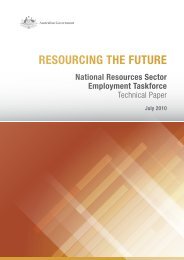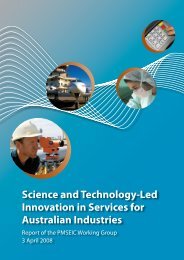National Survey of Research Commercialisation - Australian ...
National Survey of Research Commercialisation - Australian ...
National Survey of Research Commercialisation - Australian ...
You also want an ePaper? Increase the reach of your titles
YUMPU automatically turns print PDFs into web optimized ePapers that Google loves.
developed by a company called Hortical, a joint effort between Central Queensland<br />
University and Victorian company Color Vision Systems.<br />
PRODUCT SUCCESS STORIES<br />
Their non-invasive sugar measurement system is based on near-infrared spectroscopy,<br />
and it enables fruit to be graded on sweetness at the packing shed stage. It means that<br />
now, consumers have science to back up eye and feel.<br />
Project leader Kerry Walsh, Associate Pr<strong>of</strong>essor <strong>of</strong> Plant Sciences at Central Queensland<br />
University, said that previously, technology had always gone into grading on external<br />
appearance. ‘For farmers, all their effort has gone into growing good-looking fruit, but<br />
there was no index <strong>of</strong> what’s inside.’<br />
Previously, a French-based company had marketed a system that removed a small<br />
core <strong>of</strong> fruit, squashed the flesh to measure sugar content, and replaced the skin before<br />
marketing the fruit. It was clearly ‘not a goer’, said Dr Walsh.<br />
‘We run the fruit under the light, it penetrates, and we look at how it is absorbed by the<br />
fruit, and that relates to sugar,’ he said. ‘In many fruits, the higher the sugar content the<br />
better the taste.’<br />
It had to be developed to a point where it could be used under harsh packing shed<br />
conditions, where speed and capacity would be important factors.<br />
The <strong>Australian</strong> <strong>Research</strong> Council awarded the university an initial grant <strong>of</strong> $50,000 in<br />
1997, then continued its support under its collaborative system, whereby research bodies<br />
working with commercial units qualify for funding. Over three years this amounted to<br />
just over $200,000.<br />
Dr Walsh said that although the ARC’s contribution was small in the overall development<br />
cost <strong>of</strong> roughly $3 million, it was critical in getting the research up and running. By the<br />
turn <strong>of</strong> the millennium, the system was ready for the marketplace.<br />
‘The year 2000 was the break point between straight R&D and commercialisation,’<br />
he said.<br />
Fruit sorted by Hortical’s system is already used by <strong>Australian</strong> fruit packhouses through<br />
The Harvest Company, with fruit marketed through Woolworths and Coles, and Dr<br />
Walsh is in the process <strong>of</strong> examining the viability <strong>of</strong> exporting the technology.<br />
IMPEDIMED<br />
A Brisbane-based company, Impedimed Pty Ltd, has developed a non-invasive<br />
diagnostic and monitoring instrument for lymphoedema which is four times more<br />
sensitive than any previous test for the condition.<br />
Lymphoedema, which involves a build-up <strong>of</strong> lymphatic fluid in the body, can be<br />
unsightly and incapacitating. It affects about 30% <strong>of</strong> women — 1.5 million worldwide —<br />
who undergo breast cancer surgery: in all, about 400,000 <strong>Australian</strong>s suffer from some<br />
form <strong>of</strong> lymphoedema.<br />
55



